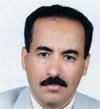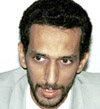
Views on the New Government [Archives:2001/16/Law & Diplomacy]
April 16 2001
Mohammed Hatem al-Qadhi
Jalal al-Sharaabi
Yemen Times
The new government of Mr. Abdulqader Bajamal has created ripples in the minds of people in the street. It has included more new faces than at any time before. To know the reactions of several groups in the society about the political spectrum and their hopes in this new cabinet, Yemen Times talked to some people.

Prof. of International Law
Sanaa University
It was not a surprise when President Ali Abdullah Saleh asked Mr. Abdulqader Bajamal to form the new government. This is because he is qualified enough to take over such a position, particularly at this time in Yemen’s history. The surprise lies in that for the first time 23 new ministers ,most of whom are highly qualified young people, are included in the new cabinet. They are known as being honest and hardworking like Dr. Wahibah Far’e, the first woman minister in the history of Yemen.
We do expect this new government, headed by an outstanding politician, to be more responsible, living up to the challenges. It has to face the already deteriorating economic condition. This is visible in the high rate of unemployment among youngsters, economic stagnation, low productivity plus the fall in the value of the YR. The new cabinet has to prioritize reform of the judiciary, education, health, security in addition to services like water, electricity, transportation, communication and others that urgently need the government’s attention.
In short, the government has to take the initiative for change and regain the trust of the public by improving their living conditions and live up to the highest expectations of the people and those of the president

Deputy Chief Editor of Nawafeth Magazine
Quds Press Correspondent
The new government of Mr. Abdulqader Bajamal is considered the second biggest government after Haider Al-Attas’s of 1990 which had 39 ministers. The surprise in the current cabinet lies in the ministries of foreign affairs, interior, and information, for they have new ministers, coming to such positions for the first time without much experience. Having a female minister was also surprising. This does not mean in any way that I am trying to belittle them. I have some comments for you to jot down about this government.
First of all, the regional representation of ministers is very clear despite the denial of official media which claims that this time, competence has been prioritized . However, reading between the lines, one could find out that all governorates of the country have been represented in this government to the extent that there are four ministers without portfolios.
Creating new ministries for human rights, environment and population and having a woman minister for human rights does not entail the recognition of the importance of such institutions in our life, and the role they will play. Rather, this aims at marketing the political regime outside and looking for new sources of loans and aids. It also aims at decorating the image of Yemen outside for being modern and civilized. And it does not matter if the nation is poor and backward, suffering from many other ordeals.
It seems, therefore, the government will propagate itself outside, neglecting its real challenge inside, which is mainly to curb the already bad economic situation. I believe it will continue lifting subsidies on basic foodstuffs and other materials. It is too early to evaluate the new cabinet, talking highly of the radical and decisive reforms it is going to take during its two-year term in office. It is also too early and unrealistic to predict its failure. We do not have a scientific method in Yemen by which we can measure how things go on.
The challenges Bajamal’s cabinet will face are how to maintain the unity of decision, creating harmony among all portfolios and good implementation of its program. Its success will depend on its ability to go beyond all partisan considerations and affiliations and working for the overall interests of the nation rather than the party’s. There is no doubt that Bajamal will pass the test unlike his predecessor who was ruthlessly assaulted even by the newspapers of his own party. Bajamal has to grasp this chance to do something good for the benefit of his political future while trying to get the country out of its ongoing crisis. I believe this government like any others will be run from behind the scenes by big guys at the power center.
Mohammed Yahia al-Sabri
writer
No other government invited so much attention as the government of Bajamal. The reason is that there are some interesting things about the government. It has succeeded a government that many were not happy with, even the president itself. The departure of Dr. Abdukarim al-Iryani, former MP and GPC Secretary-General, was augmented by two main events like the constitutional amendment referendum and local elections, which reflected the miserable state of his cabinet and the surest indication things were going bad. The media barrage, supported by some politicians at the power center, that targeted Iryani and some of his ministers might have added fuel to the fire. Or, it might have had a contrary result, raising the people’s demand for a new honest cabinet.
The second interesting thing is that the government media created a big fuss about the new government prematurely, raising the slogan of” government of the youth”. Interestingly, the new young ministers were not selected on the basis of ability or competence to perform. Rather, some of the old faces known for their incompetence were inducted into this new government on the basis of their tribal as well as regional affiliations. This regional representation of the new cabinet might also be behind the controversy raised about the government.
The most interesting thing is the choice of Bajamal as a PM who is known for his dynamism. These things were an interesting topic for the opposition papers which will focus on Bajamal’s statements more than any other minister.
Mr. Abdulaziz Abdulghani, known for his good experience and transparency, was the strongest challenger for this position. But he declined to take it for the third time since unification in 1990, which paved the way for Bajamal. The insistence of Iryani to leave the post to protect what remains of his tarnished reputation facilitated the nomination of Bajamal. Nowadays, the official media say the choice of Bajamal has something to do with his ability to attract more Hadhrami investors from abroad to Yemen because he comes from Hadhramaut. This is , of course, a groundless explanation and investment has nothing to do with Bajamal the person. He has the skill to swim with the current and adapt himself according to the situation. In the pre-unification days he was a strong defender of nationalization and now he is a defender of privatization.
At the regional and international level, Bajamal is welcomed by the neighboring countries for he signed the memorandum of understanding in 1995 and the border treaty in 1999 between Yemen and Saudi Arabia. Later, he coined a new term of ” partnership” with other countries which is commonly used now without understanding what it really means.
The field of upcoming battles between the government and opposition parties, mainly Islah, will be education, endowments and elections.
——
[archive-e:16-v:2001-y:2001-d:2001-04-16-p:./2001/iss16/l&d.htm]


